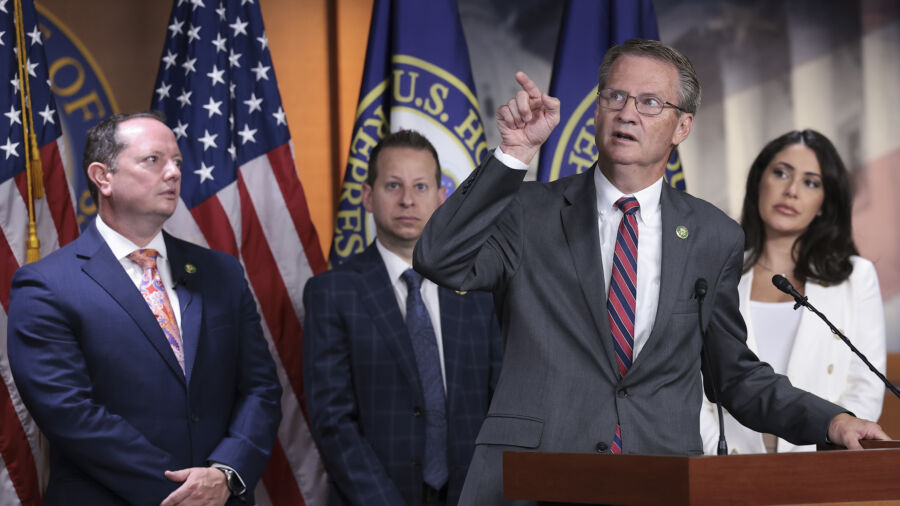Various factions of House Republicans are looking at different options to address spending as lawmakers have just days left to pass a budget before a partial government shutdown begins.
The Republican House majority has remained divided for weeks over how to go about funding the government, with several members of the staunchly conservative House Freedom Caucus calling for cuts to discretionary spending. Rep. Marjorie Taylor Greene (R-Ga.) has also insisted she will oppose any budget deals that include additional U.S. funding for Ukraine’s military. Rep. Matt Gaetz (R-Fla.) has also floated the possibility of removing Rep. Kevin McCarthy (R-Calif.) from his position as the House speaker, suggesting Mr. McCarthy has not met his commitments to conservatives on the budget.
On Tuesday, the Republican House majority passed a procedural hurdle, setting the stage to consider four spending bills totaling nearly $1.1 trillion. The vote garnered the support of several House Freedom Caucus members, raising the prospect that the Republican House majority can advance at least some budget measures. Mr. McCarthy also indicated he would have a proposal for a continuing resolution (CR) by the end of the week, giving lawmakers more time to come to an agreement on spending before the government shuts down.
Even if the House can pass the four spending bills, or a CR to buy time to strike a deal on the rest of the government budget, they will have to reconcile these bills against budget proposals being advanced by the Democrat-controlled Senate.
Moderate Republican Prepping Deal With Democrats
Speaking with NTD, Rep. Brian Fitzpatrick (R-Pa.) said he has been working on a bipartisan budget deal.
“We have the appropriations bills, four of them, that are going to be up for a vote this week. I’m not sure how many, if any, are going to pass,” Mr. Fitzpatrick said. “But eventually we’re going to have to keep the government open. And we have a bill that will do it.”
Mr. Fitzpatrick, who co-chairs the House’s bipartisan Problem Solvers Caucus, said the budget bill he has been working towards has the support of four Democrats and four Republicans.
He said it includes funding for border security, which has been a Republican priority in the spending debate. He said the deal also includes funding for Ukraine, which has more sharply divided members of his party. He said the bill would also renew federal authorization for the Temporary Assistance for Needy Families program, community health centers, and the Federal Aviation Administration.
“We have a four-vote margin in the House. So do the math. I mean, we should be able to get that across the finish line,” he said. “So that’s what I hope happens.”
Mr. Fitzpatrick said he is also considering options to force a vote on the bipartisan deal even if Mr. McCarthy opposes it.
“We’re meeting with the parliamentarian. We’re going to find out every option we have to force a vote on our bill,” he said.
Some Freedom Caucus Members Won’t Back McCarthy CR
For weeks, the House Freedom Caucus has indicated it will oppose a “clean” CR that keeps existing government spending trends in place until Congress can reach a full budget deal for 2024.
Rather than continuing existing spending, House Freedom Caucus members have fought to include a variety of conservative policy demands even in a short-term government funding deal. House Freedom Caucus members have called for rolling government funding back to fiscal year 2022 levels in a short-term deal, while adding border security provisions and rolling back Department of Defense policies opposed by many conservatives.
Last week, some House Freedom Caucus members indicated they had productive discussions with other members of their party about the budget process, including their demands for a short-term CR.
While the Republican majority may pass a CR that fulfills several requests sought by much of the House Freedom Caucus, some members of the staunchly conservative wing may still object to a CR altogether. Rep. Tim Burchette (R-Tenn.) indicated he is one such House Freedom Caucus member who won’t accept a short-term funding deal, even with the policy riders sought by other members of his voting bloc.
“I’m prepared to vote against it because the reality is, as they’ve stated many times, it’s not going anywhere in the Senate,” Mr. Burchett told NTD.
Mr. Burchett said House Republican leadership should have acted sooner to address concerns within the party about the budget process.
“Here we are, backed up to a shutdown,” he said. “You know, it’s funny, September 30 comes around about this time every year. And so we should have been prepared for it.”
Mr. Burchett said he’d also be willing to consider the proposal of his colleague, Mr. Gaetz, to oust Mr. McCarthy from the speakership.
“It’s something that I’d look at,” Mr. Burchett told NTD.

